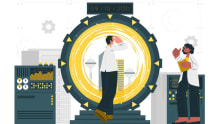The importance of performance and rewards to ensure productivity in challenging times

During unprecedented socio-economic crises like the current COVID pandemic, there is undeniable impact on corporate health and employee productivity. From the employer’s perspective, it is critical how rewards and performances are aligned to bring back the desired productivity while continuing to optimise cost, quality and effectiveness without undermining the fundamental organisational values and core competencies.
As a consequence, elements such as remote working, distributed workforces, contingent workers etc. that were earlier connected to millennials and the future of work are very much a reality now as the new normal is poised to take over. With unequal and inadequate infrastructure to deal with the evolving scenario, there is a need to focus on digitally empowered infrastructure, unconventional ways of decision making using limited information & a non-hierarchical, skill-oriented manner of job analysis. This, in turn, has led to an innovation in the way performance is measured, by linking financial rewards to the desired output, while non-financial rewards used as input measure or process improvements with wide acknowledgement, can boost the morale of the employees.
In contrast to the traditional working style, where the senior management is mostly responsible for decision making and front or middle management is accountable for execution, the current workspace will undergo rapid change where everyone will have to have an ambidextrous approach to work, right from the ability to conceptualise to being hands on during the execution with respect to their roles and responsibilities. While navigating the VUCA (Vulnerability, Uncertainty, Complexity and Ambiguity) arising during or as an aftermath to the crisis, which has become a key differentiator in the competencies of any employee, it is the ability to adapt to the new rules of engagement between individual and organisations that is going to be the mark of new normal. Through consistent output delivery with lower supervision and the readiness to multiskilling amongst employees, organisation can look forward to different working conditions while re-imagining the performance and rewards practices among the workforce.
As the crisis continues to unfold and brings many disruptions, reshaped consumers behaviour will lead to workforce consolidation, tilting towards a more vibrant, adoptive, driven and tech savvy workforce mix of millennials & GenX.
Multiskilling, job sculpting and trust based engagement of line managers will be key drivers in an objective & result driven performance measurement approach. A comprehensive performance management system will multiply productivity.A structured performance management process can strongly support ongoing efforts to build accountability into the organizational culture. It helps to keep everyone aligned with strategic goals, and it focuses people’s attention on what needs to get done and by when. Without it, management may find themselves going off track and forgetting to measure and reward behaviour and actions deemed important.
Specifically, an effective performance management system:
- Communicates how individuals contribute to business success and how they will be evaluated.
- Aligns individual goals with key business priorities, resulting in greater focus, more efficient use of resources, and less time wasted on non-value added activities.
- Provides a comprehensive system for recognizing what gets done and reinforcing how it is achieved.
- Creates a discipline of measuring progress against specific goals and adjusting as necessary.
However, a lack of trust between employees and the line management results in declining productivity and loss in business due to missed deadlines and broken commitments, leading to lower employee morale and higher turnover. These are just some of the more obvious consequences of a poorly implemented performance management system.
Perhaps the most overlooked, and costliest, consequence is the loss of top performers. When superstars see poor performers getting a free ride because no one holds them accountable, they start looking for other places to work. And make no mistake, even in a bad economy, top performers can almost always find a job elsewhere.
Performance & reward communication during challenging times must maintain transparency and table all the facts clearly but compassionately, two aspects that businesses owe their employees. This helps them make their own contingency plans and know what is coming their way. There is currently is adequate awareness of the economic implications the pandemic is likely to bring in its wake. So, it is important for businesses to communicate honestly and call a spade a spade, so that average performers can get a heads-up of impending layoffs and the top performers can be assured that when the economic climate recovers, they will be given their dues.
Employers want a productive workforce; but to recognize them for their efforts and increase productivity, they must understand how to incentivize employee performance. It is an equation with a fairly simple solution: rewards and recognition programs are instrumental in increasing employee productivity
Rewards and recognition are a win-win for employers and employees alike. Organisations with optimized rewards practices can enjoy increased employee productivity and lower turnover rates.On the other hand, these crisis-hardened super employees may no longer be motivated with pure cash andwill require customised experiences based reward systems like an Employee Assistance Programme, counselling, seamless medical services during family health crisis, employee safety practices and mentoring based development to take care of mental health needs. Financial rewards like salary and pay hikes can be consolidated as short-term packaging with attractive long-term incentives. ESOPs will be key factor in bringing in the right and sustainable behaviour to perform job roles as this will give them psychological job security and a sense of being with a stable organisation.
Too often, companies obsess over major accomplishments. Of course, celebrating big wins is important, but tunnel vision regarding major accomplishments may detract from recognizing the work that went into the smaller milestones along the way — milestones that were essential toward making your big win happen. So, recognising the small achievements too are critical in long run.
Ambiguous rewards guidelines can frustrate and alienate employees. Employees who are left in the dark on reward criteria may perceive it as unfairness or bias when the recipients are announced. The best rewards programs clearly announce and communicate their judgment parameters. They also delineate the process by which rewards and recognition are distributed.
Performance, rewards and productivity are not exclusive to each other; rather, they are linked to the integrated business HR processes and with the remote work and distributed workforce. Leveraging technology has become the need of the day rather than just a tick in the box. Technology is playing a major role in employee performance, rewards, recognition, incentives and engagement. The advantage of technology-enabled rewards is that it helps companies make sure that systems and procedures are maintained seamlessly for an effective delivery of employee value proposition.
Last but not the least, employees will be riding high on productivity with empowerment, support from line management, clarity about what needs to be delivered and the availability of the right tools with candid feedback. Secure, organisational ecosystems aligned with a recalibrated approach to both financial and non-financial rewards will reshape engagement within the employee-employer-consumer-supplier chain and ensure sustainable progress for years to come in the new normal.














